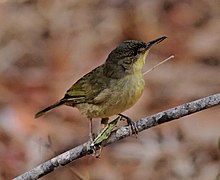| Madagascan warblers | |
|---|---|

| |
| The long-billed bernieria (Bernieria madagascariensis) was formerly placed in the Pycnonotidae | |
| Scientific classification | |
| Domain: | Eukaryota |
| Kingdom: | Animalia |
| Phylum: | Chordata |
| Class: | Aves |
| Order: | Passeriformes |
| Superfamily: | Sylvioidea |
| Family: | Bernieridae Cibois, David, Gregory & Pasquet, 2010[1] |
| Genera | |
|
see text | |
The tetrakas, also known as the Malagasy warblers, are a recently validated family of songbirds. They were formally named Bernieridae in 2010. The family currently consists of eleven species (in eight genera) of small forest birds. These birds are all endemic to Madagascar.
In 1934, the monophyly of this group was proposed by Finn Salomonsen but the traditional assignments of these birds were maintained, mistaken by their convergent evolution and the lack of dedicated research. The families to which the Malagasy warblers were formerly assigned—Pycnonotidae (bulbuls) and even more so Timaliidae (Old World babblers) and the Old World warbler—were used as "wastebin taxa", uniting unrelated lineages that were somewhat similar ecologically and morphologically.
It was not until the analysis of mtDNA cytochrome b and 16S rRNA[2][3] as well as nDNA RAG-1 and RAG-2 exon sequence data,[4] that the long-proposed grouping was accepted.[5]
- ^ Cite error: The named reference
cibois2010was invoked but never defined (see the help page). - ^ Cite error: The named reference
cibois1999was invoked but never defined (see the help page). - ^ Cite error: The named reference
cibois2001was invoked but never defined (see the help page). - ^ Cite error: The named reference
beresford2005was invoked but never defined (see the help page). - ^ Cite error: The named reference
iocwas invoked but never defined (see the help page).